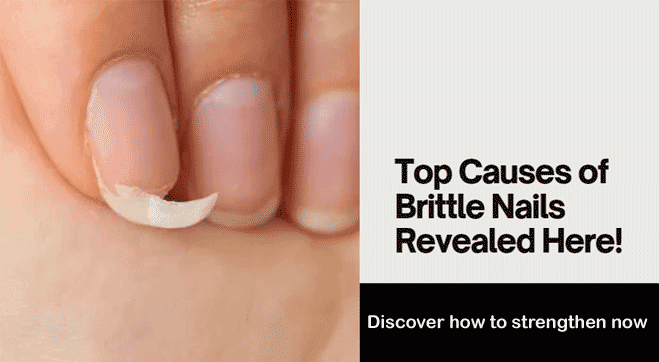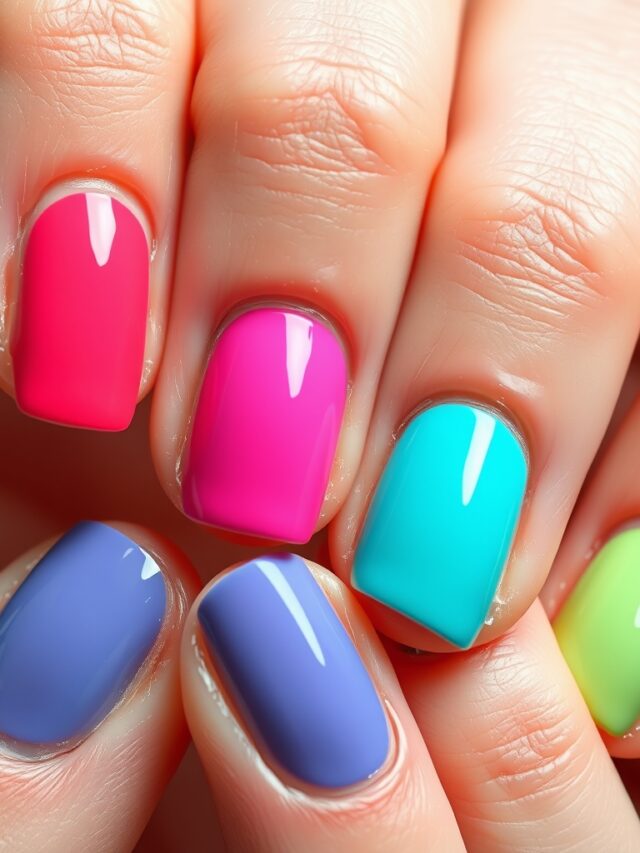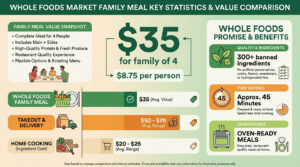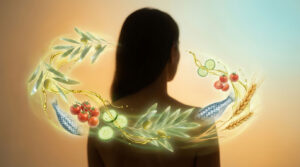Brittle nails are a common and often frustrating condition characterised by nails that split, crack, or break easily. Regardless of age or gender, this condition can affect anyone.
Likewise, there are many causes of brittle nails. One major cause is vitamin and mineral deficiencies, such as those related to biotin and iron. Other common causes include environmental factors and certain health conditions, such as fungal infections and hypothyroidism.
In the later sections of this blog, we have discussed the causes and signs of vitamin deficiency in brittle nails. For more comprehensive information about maintaining healthy nails and preventing nail problems, check out best resources.
Do you know:
- Also called nail brittleness or nail fragility, brittle nails affect almost 20% of the world’s population, with the majority of people being female. This condition is more commonly seen in women aged above 50 years.1
- Likewise, among other brittle nail causes, ageing is a primary cause. A study showed that 40% of elderly males (men above the age of 60) had brittleness in their nails. 2
Why Are My Nails Breaking? Common Concerns About Nail Health
‘Why are my nails breaking?’ is a common question most people ask when they see dry, split, or even chipped-off nails.
While brittle nails can be a very common condition indicating signs of vitamin deficiency in nails, the overall health of your nails is influenced by a variety of aspects, ranging from exposure to certain environmental conditions to your lifestyle habits.3
Here are some common concerns relating to your nail health that you must give attention to before it gets worse—
- Onychoschizia (rough nails that split easily)
- Overly soft nails (it indicates weak nails that can break easily)
- Peeling
- Ridges
- Natural colour changes in the nails, which can range from yellow to black
- White spots on the nail
What Are Brittle Nails? Why are Brittle Nails a Common Problem?
The official term for brittle nails is Onychoschizia. It results in rough nails that are prone to easy–
- Breakage
- Cracking
- Splitting
As a result, your nails might appear dry, thin, and fragile, often peeling at the tips. This can affect both fingernails and toenails and for many people, it could be a recurring issue.
Brittle nails can be caused by various internal and external factors that compromise the strength and resilience (ability to heal after breaking, cracking, or splitting) of the nail plate.
Brittle nails are a common problem because they are caused by common day-to-day habits such as—
- Washing the dishes
- Overuse of moisturiser
- Excess application of acetone or nail paint remover 4
Following these, you can have various signs of vitamin deficiency in nails, which might be the underlying cause of brittle nails. We have explained these in more detail in the sections below.
Brittle Nails Causes: 4 Factors That Might Be The Root Of Your Problem
Nutritional deficiencies, environmental factors, ageing, genetics, and certain adverse health conditions are the general and usually the primary causes of brittle nails.
1. Nutritional Deficiencies
When your body does not have enough nutrients, your nails can become weaker, resulting in brittle nails. This happens because of a deficiency of vitamins and minerals like iron and zinc.
Likewise, brittle nails result from a deficiency in vitamins such as biotin, vitamin B7, vitamin E, and vitamin C.
How Lack of Nutrients Impacts Nail Health?
Nails require a steady supply of nutrients to maintain their strength and flexibility. If there’s a deficiency in any of the essential nutrients (especially those mentioned in the above sections), you can notice structural changes in the nails, making them more prone to damage. 5
Specific Vitamin and Mineral Deficiencies Linked to Brittle Nails
Specific vitamin deficiency symptoms can lead to brittle nails, and some of these deficiencies are as follows:
- Biotin (Vitamin B7): It is essential for keratin production. Biotin deficiency leads to weak and brittle nails.
- Iron: It is necessary for oxygen transport. Deficiency results in spoon-shaped, brittle nails.
- Zinc: It is important for cell division and growth. Deficiency causes white spots and slow nail growth.
- Vitamin C: Needed for collagen synthesis. Deficiency leads to fragile nails.
- Vitamin E: Protects against oxidative damage. Deficiency results in dry, brittle nails.
Signs of Vitamin Deficiency in Nails
Your nails are a cosmetic feature and an indicator of your overall health. Brittle nails cause deficiencies in essential vitamins and minerals, which can manifest in the nails, providing visible clues to underlying health issues.
Some common signs of vitamin deficiency in nails include—
- Formation of ridges along the edges of your nail bed
- Dryness in the nails
- Hangnails
- Cracking Nails
- Irregularly shaped Nails 6
Understanding these signs can help in early diagnosis and treatment of vitamin deficiencies.
1. Vitamin B7 (Biotin) Deficiency: Symptoms and Effects
Biotin, also known as Vitamin B7, is crucial for healthy nail growth. It plays an important role in the formation of keratin, the primary protein in nails.
Symptoms
Brittle nails vitamin deficiency symptoms that arise because of a lack of vitamin B7 in your body include–
- Brittle and thin nails
- Splitting and peeling nails
- Slow nail growth
Effects
The above symptoms can result in—
- Increased nail fragility
- Higher susceptibility to nail infections
- Overall, poor nail health
Biotin supplementation has been shown to have promising results in—
- Improving nail strength
- Reducing brittleness
Some foods that can supply your body with enough vitamin B7 to help you deal with brittle nails’ vitamin deficiency related to it include–
- Sweet potato
- Egg yolk
- Dairy products
- Nuts
- Seeds
- Cauliflower
- Organ meats (Eg. liver)
- Yeast
- Salmon
- Avocado
Along with these, you can also opt for multivitamins, as they can easily replace the lack of vitamin B7 and offer many other multivitamin benefits, such as enriching your body with an extra supply of nutrients.
2. Iron Deficiency: Symptoms and Effects
Iron plays a key role in haemoglobin production. Haemoglobin is responsible for carrying oxygen to different parts of the body, including the nails. When iron deficiency causes brittle nails, the condition is known as koilonychia or spoon nails.
Symptoms
- Thin, flat, or spoon-shaped nails
- Pale or yellowish nails
- Increased nail brittleness
Effects
The above symptoms can result in—
- Reduced oxygen supply to the nail matrix
- Impaired nail growth and development
- Greater risk of nail infections
Hence, to cope with iron deficiency, you can increase the quantity of the following iron-rich foods in your daily diet–
- Red meat
- Beans
- Lentils
- Fortified cereals
Iron supplements may be necessary for individuals with significant deficiencies.
3. Other Essential Vitamins and Minerals
While the main causes of brittle nails mostly involve vitamin B7 and iron deficiencies, other essential vitamins like E and C and minerals like zinc are equally important.
Vitamin E
Vitamin E is a powerful antioxidant that protects the nails from oxidative damage. 7
Brittle nails vitamin deficiency related to vitamin E has the following impact on your nails—
- Yellowing of nails
- Dryness
- Nail cracking and peeling
Hence, you can opt for Vitamin E supplements or use vitamin E oil to moisturise your nails and prevent them from cracking.
Vitamin C
Vitamin C produces collagen, which is crucial for supporting nail strength and enhancing its integrity (the ability to minimise breakage of nails)
Vitamin deficiency in brittle nails resulting from a lack of vitamin C causes the following symptoms—
- Slow nail growth
- Nails that bruise easily
Therefore, to supply your body with enough vitamin C, you can increase the consumption of the following food items—
- Citrus fruits
- Strawberries
- Kiwi
- Bell peppers
- Green vegetables
- Tomatoes
Wondering if you might have vitamin deficiencies? Get a vitamin profile test to rule out the possibility.
Zinc
Zinc is a vital mineral for cell division and growth. Thus, it affects nail health significantly.
White spots on nails and slow nail growth are the most easily detectable symptoms of zinc deficiency.
Some good sources of zinc include—
- Soy
- Chickpeas
- Black beans
- Almonds
- Cashews
- Seeds
- Beef
- Poultry
- Fish
- Eggs
Environmental Factors
Brittle nail causes often include external factors. These can be related to the environment you mostly stay in and can contribute to brittle nails, even in the presence of adequate nutrition.
Some of the environmental factors that can cause brittle nails include excess exposure to weather conditions that are too—
- Hot
- Cold
- Dry
Health Conditions
Certain health conditions can adversely affect nail health, contributing to brittleness and other issues. These include the following:
Hypothyroidism (A Thyroid Disorder)
Hypothyroidism is a condition in which your thyroid gland becomes incapable of producing enough thyroid hormone. As a result, many of your body’s natural processes come to a halt. This includes nail growth. Hence, it can cause brittle nails. 8
Fungal Infections
Fungal infections can damage the nail bed, leading to brittle and discoloured nails. 9
Psoriasis and Other Skin Conditions
Psoriasis can affect the nails, causing—
- Brittleness
- Pitting
- Discolouration
- Separation of the nail from the nail bed 10
You can book a blood test at home to find out whether you have any underlying health conditions that could be causing your brittle nails.
Ageing and Genetic Factors
Apart from brittle nails, vitamin deficiency, ageing, and genetic factors can also cause nails to become weak and easily breakable.
Natural Changes in Nail Strength Over Time
Brittle nails causes include ageing. As people age, their nails naturally become more brittle and drier. This is due to a decrease in the production of natural oils and a slower rate of nail growth.
Genetic Predisposition to Brittle Nails
Some individuals may inherit a genetic predisposition to brittle nails. This can result in nails that are naturally weaker and more prone to damage, regardless of nutritional status or environmental factors.
Identifying Signs of Vitamin Deficiency in Nails
Recognising the signs of vitamin deficiency in nails can help in their early diagnosis and make scope for more efficient treatment.
So, here are the common signs of vitamin deficiency in nails:
1. Brittle Nails
One of the most common signs of vitamin deficiency in nails is cracking, chipping, or splitting easily. This condition can be attributed to a lack of biotin, also known as vitamin B7. Biotin is essential for keratin production, a protein that forms the structure of nails. Without sufficient biotin, nails become weak.
2. Spoon-shaped Nails (Koilonychia)
Iron deficiency anaemia can lead to a condition called koilonychia, where the nails become thin and spoon-shaped. This condition is characterised by nails that curve upward at the edges, forming a concave shape.
You need iron to produce haemoglobin, which carries oxygen to various body parts, including the nail matrix. An iron deficiency reduces oxygen supply, leading to abnormal nail growth.
3. White Spots on Nails
If you see streaks or white spots on your nails, it can indicate a zinc deficiency. Zinc is a crucial mineral for cell growth and division. A lack of zinc can impair nail development, causing white spots to appear.
While occasional white spots can be due to minor trauma, persistent or widespread spots may suggest a deficiency.
4. Slow Nail Growth
Slow nail growth can indicate several nutritional deficiencies, including vitamin C and zinc.
- Out of many things, you need Vitamin C for collagen production, which supports nail strength and growth.
- Zinc, on the other hand, plays a role in cell division and growth.
So, a deficiency in either of these nutrients can result in slower nail growth.
5. Yellow Nails
Yellow nails can indicate a deficiency in vitamin E. This powerful antioxidant protects cells from oxidative damage.
A deficiency of vitamin E can lead to yellowing and thinning of the nails. Additionally, yellow nails may suggest other health issues, such as fungal infections or respiratory problems.
6. Ridges in Nails
Vertical or horizontal ridges in nails can indicate vitamin B12 or iron deficiency.
- Vertical ridges are more common and can occur due to ageing or lacking essential nutrients.
- Horizontal ridges, also known as Beau’s lines, are more concerning and may indicate a severe deficiency or underlying health condition.
7. Pale or Blue Nails
If you have pale nails, it can be a sign of anaemia—often caused by a deficiency in iron, folate, or vitamin B12. Blue-tinged nails, conversely, can indicate a lack of oxygen in the blood, potentially due to iron deficiency anaemia. Ensuring adequate intake of these nutrients is crucial for maintaining healthy nail colour.
8. Dry and Cracked Nails
Dry and cracked nails can result from a deficiency in essential fatty acids, vitamins A and C. These nutrients are vital for maintaining the integrity of the nail bed and preventing dryness. A lack of hydration can also exacerbate this condition, so staying well-hydrated is important.
Nutritional Strategies for Healthier Nails
Nails, like hair and skin, require a balanced diet rich in vitamins and minerals to stay healthy. A deficiency in any of these nutrients can lead to visible changes in nail appearance and texture. If you pay attention to these signs, you can proactively address potential deficiencies and improve their overall health.
Some nutritional strategies that you can adopt for healthier nails include–
- Biotin and zinc supplementation
- Having an iron-rich diet
- Increasing the intake of foods rich in Vitamin C and E
- Drinking adequate water and consuming hydrating foods like fruits and vegetables can help you prevent dry and cracked nails.
They might be tiny, but it’s safe to say that nails reflect our overall health. A well-balanced diet rich in essential vitamins and minerals, along with proper nail care, can help maintain healthy and strong nails. If you notice persistent changes in your nails, our advice is to take a complete body checkup package for a thorough evaluation and appropriate treatment.
Sources
Ref Links:
- Pathogenesis, Clinical Signs and Treatment Recommendations in Brittle Nails
- STUDY OF NAIL CHANGES AND NAIL DISORDERS IN THE ELDERLY
- What These 8 Fingernail Signs Say About Your Health
- What to know about brittle nails
- Top 8 Vitamins and Nutrients for Healthy, Strong Nails
- Fingernail Health – Nutrition for Dry, Brittle Nails
- Ten benefits of vitamin E oil
- Hypothyroidism
- Nail fungus
- Nail diseases chart: Identification and remedies









